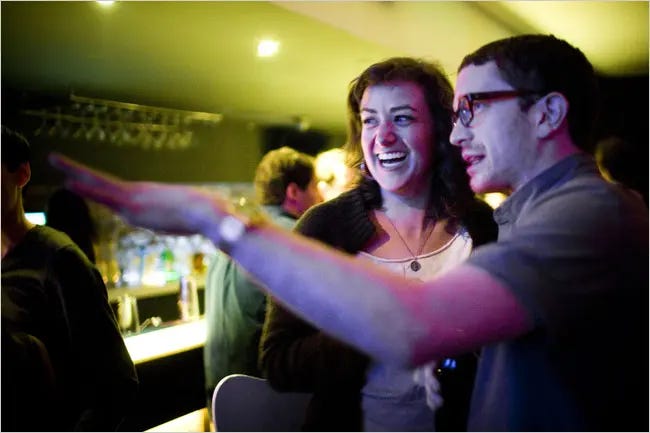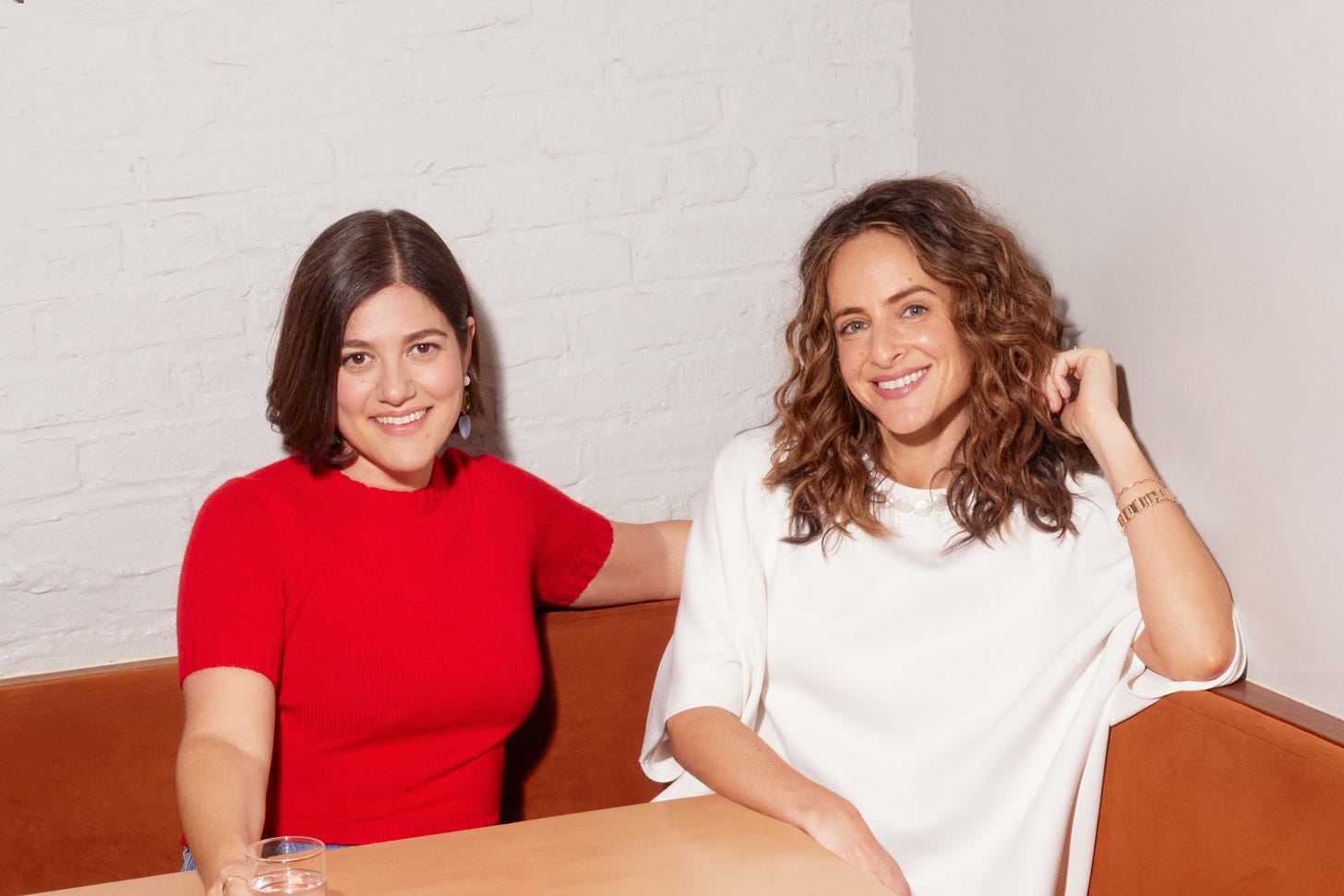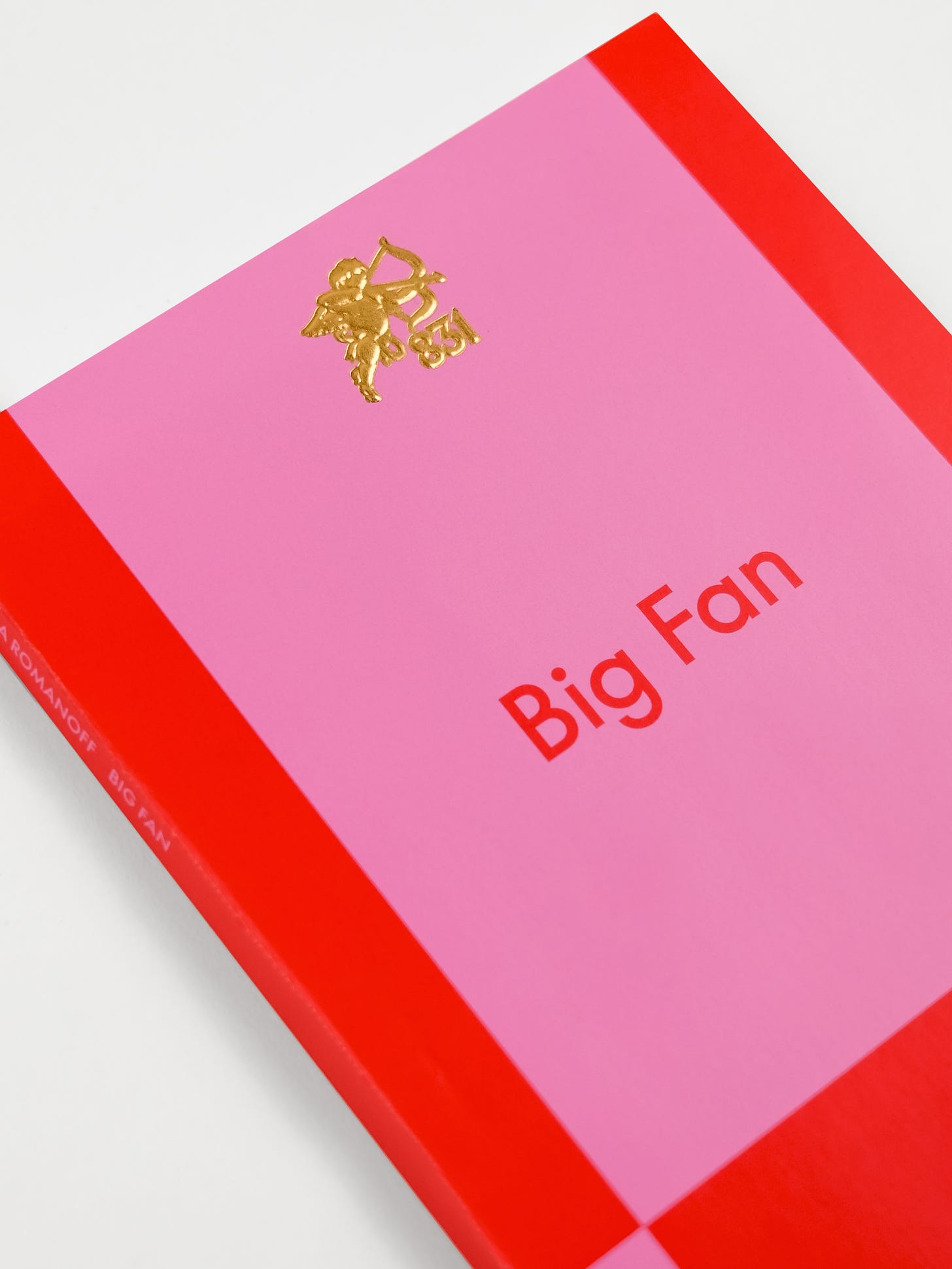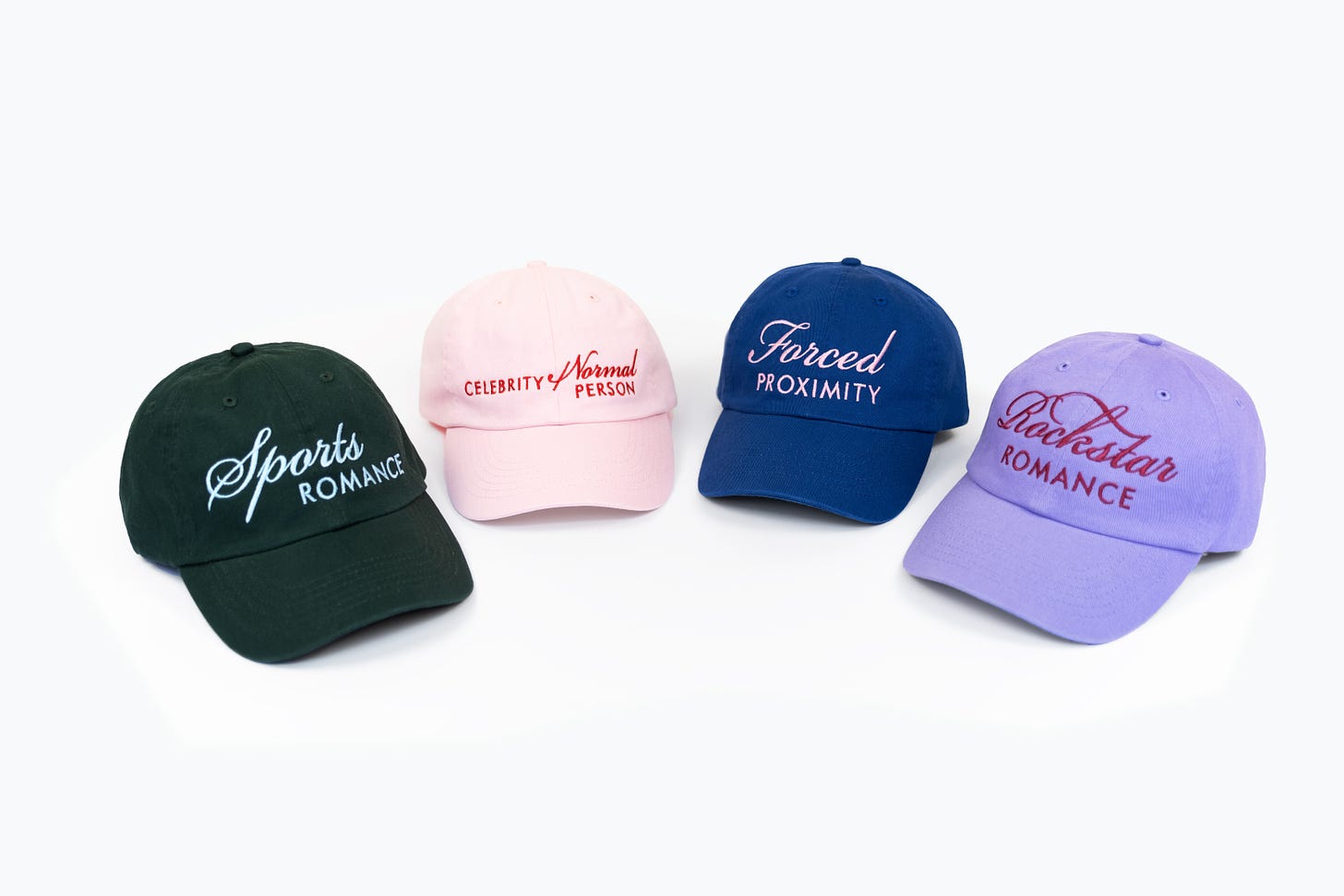Why I was so wrong about romance novels
5 questions for style icons, besties, and publishers Claire Mazur and Erica Cerulo
I’m usually the girl in the corner talking about death at an otherwise perfectly light-hearted party. I’m not afraid to be called a feminist killjoy, or a cat lady, or whatever else some empty-headed, egomaniac wants to cook up to try to cramp my style. I’m serious. I mean, you all know—you read this newsletter. I am intentional bordering on obsessive about how to live meaningfully.
BUT, that doesn’t mean I don’t understand the value of pleasure and joy and delight (thanks Ross Gay!) and, in fact, I feel like I am leaning into those things more and more the older and older I get! I am one of those old souls getting younger and more playful as I age.
So it is with great fanfare that I announce that I am learning at this late stage of obsessive reading that romance novels are awesome! I owe this revelation to my friend, Claire Mazur.
At a wedding last winter, she started talking my ear off in the shuttle about how I needed to give romance novels a chance. She’s smart as hell, and really gets me, so I took her two recommendations and dutifully read them over the holiday break (with no small amount of skepticism). And lo and behold, she was right. I liked one rec more than the other for various reasons, but I understood why the wild ride that they took me on was not silly, but enlightening (in the sense of helping me lighten the hell up) and embodying (in the sense of getting out of my damn head for a minute).
For so many reasons, romance novels are becoming an essential ingredient in my sacred reading diet. And Claire and her business partner and bestie Erica Cerulo’s new company, 831 Stories, will be the source for all the best, smartest stuff. I just read their very first book of their new imprint (about a heroine who is pushing universal basic income, no less!) and LOVED it.
Meet Claire and Erica…
Courtney Martin: Why are romance novels for smart girls, too? (I feel like many people have a stereotype about them being a lower literary life form...I certainly did until Claire showed me the light).
Claire (the one on the right): There’s this great quote in a piece that Katie Fustich wrote for LitHub:
“Romance novels are the only type of literature that is considered actively anti-intellectual—the only kind of book one could read and somehow others would have a basis to consider you less intelligent for doing so.”
Listen, you’re obviously not alone in having stereotyped them—Erica and I were carrying around a bias before we started digging into the genre, too. But the moment you start to question that stance, it reveals itself as both illogical and anchored in misogyny.
Relationships, sex—these are the driving forces in our lives. Why are we diminishing a genre that uses those themes as a basis for exploration, education, commentary, and celebration? Romance is a genre by and for women, and it’s one of the only forms of entertainment that prioritizes female pleasure and offers up depictions of sex by and for women. It’s an antidote to the insidious and pervasive ways that porn informs our standards around sex and beauty. I’d so much rather my son learn about sex by sneaking a smutty book off of my shelf than from an internet search.
The other reason the genre gets a bad rap is because its formulaic, but there’s so much beauty in the constraint and comfort provided by that. The guardrails give writers freedom to get wildly creative and especially pointed in their messaging. They also give readers the freedom and willingness to go there with authors because they have the safety of knowing where it’s all headed.
I think a lot of people associate romance on the whole with more mainstream, conservative mindsets—like Hallmark—but in fact so many of the bestselling contemporary romances are quite progressive in their cultural and political commentary, and the category on the whole is an effective trojan horse for a lot of things you might not expect. (Did you know Stacy Abrams is a romance author?!) Check out Sanjana Basker’s excellent TikTok for some particularly insightful analysis on the messaging in romance—she’s constantly dropping nuggets like ”Of course, the enduring goal of romance is to show you the many ways in which people build community.”
Okay, one more thing: Romance is a wildly profitable and entrepreneurial genre, and the publishing industry would be far more troubled than it already is without its readers, half of whom average a book a week. (For context: Only half of Americans read a single book in a year.) This fandom is really reading—if that’s an activity we care about, something we all agree we wish people would do more of, why would we discount this?
How did you two get into romance novels? Do you have similar or different taste in your favorite kinds?
Claire: We’d both dabbled over the years—Erica was a huge reader of YA, so much of which is just romance with a PG-13 rating, and I was early to Jasmine Guillory’s books. But then Bea Koch, a woman who interned for us at our first business, went on to co-found, with her sister Leah, the first romance-only bookstore in the U.S., The Ripped Bodice. They’ve been incredible champions of the genre for a long time, and they’ve been consuming it since they were young. They helped expose us to and educate us about the genre.
The two of us do (thankfully) have very similar taste in the books. We both read The Idea of You by Robinne Lee at the start of the pandemic. While not *technically* a romance (it doesn’t have a “happy ever after,” known in the romance world as an “HEA”), it was one of the first to captivate us in a really big way, and it led us to seek out authors like Tia Willams, Talia Hibbert, and Tessa Bailey. Around the same time, Emily Henry and Colleen Hoover were starting to see truly unprecedented levels of popularity, and it got our wheels turning—and our mouths yapping—about the cultural significance of the genre reaching mainstream audiences.
What is going to set 831 apart from other imprints that publish romance and why do we need just exactly this right now?
Erica: We think of books as the foundation for what we envision as a full-fledged entertainment company meant to serve the romance fandom through many different types of storytelling. To paint a bit of a picture: The first 831 Stories book, Big Fan by Alexandra Romanoff, is about a political strategist, Maya, whose ex-husband cheated on her in a front-page-of-the-Washington Post way. Just as she’s started working on a universal basic income initiative for a gubernatorial candidate, she hears from a former boy-bander whose fan club she ran as a teen: Charlie Blake. He wants her help launching his solo career, and though she’s not about to jump ship, they end up scratching each other’s backs and (you guessed it) fall in love.
When you finish the book, you’ll be able to stay in the Big Fan universe in a way that’s so exciting and satisfying to us—people who really want to linger with these characters beyond the pages. You can read the epilogue on our website. You can stream Charlie’s first single “Longer Gone” (that Claire and I are so dorkily obsessed with). You can buy the fan club tee Maya gives Charlie in Act II and the necklace he gives her in Act III. You can read fanfic we commissioned based on the book. It is all so fun and joyful, and it feels like there’s endless opportunity to create.
One of the things Claire and I talk about a lot is the idea of pleasure reading—and the idea of seeking pleasure, in general. Are we at a place, culturally, where we can embrace that a piece of art doesn’t have to be sad or hard to be good? To take this in a direction that I think will speak to you: At the MoMA last year, I read a little sign where Matisse was described as “one of the great joy-givers of the 20th Century,” and that really lodged itself in my brain. It shouldn’t feel like a novel thing to celebrate joy and pleasure!
What is your curatorial process going to be like - how will you find your authors and how are you thinking about where and what kinds of events take place? (I’m especially intrigued by this because of the way you all designed Of A Kind to talent scout artisans and entrepreneurs in such values-aligned ways. I’m sure you’re not going to do this like every other publishing company.)
Erica: You’re much wiser than us because I don’t think we realized that we would be talent-scouting for writers for 831 Stories in a similar way as we did with designers (and, frankly writers and photographers) at Of a Kind. But it really has looked similar, in many ways: It involves having a zillion conversations with people who you think might get it—might have the right POV, might relish the creative exercise, and might be game. We’re working with writers—everyone from playwrights to poets to YA authors—who are keen cultural observers and have a strong sense of relationship dynamics. They have to be excited about the ways in which the classic romance formula allows for play, and they also have to be down to write explicit sex. We feel very strongly about there being sex on the page.
In general, we think there’s something exciting about bringing new voices to the genre who might not already or otherwise be writing in it, not least because we think that’s likely to attract new readers to the genre, too.
If your life were a romance novel, what would it be called?
Erica: Campus Novel, College Try, or Extra-Long Twin Sheets? Let’s workshop it. I met both the loves of my life—my husband Thomas and Claire—at the University of Chicago.
Claire: Lampshade Man? When I started dating my now-husband everybody had a story to tell me about him, but the most common and memorable was about a dance contest he won while wearing a lampshade on his head. Oooh, or, actually maybe Can Buy My Love—he made his first move by purchasing something from our first business, Of a Kind, right from my cell phone. It was 2011 and I didn’t even have a smartphone yet, so it was sort of an impressive feat.
This last answer made me smile from ear to ear because Claire’s husband is, in fact, one of my best friends on earth and someone who I definitely told her too many stories about. I remember when they were falling in love and it was really the sweetest, best thing in the world. To find that I not only liked her, but enjoyed, respected, and admired her, was a real cherry on top to the friendship I already cherished with my friend, Chris. Isn’t that the best?

Okay, get this book immediately and follow this titillating, smart effort here.







As a Scorpio, I’m always in the deep end of the conversational pool. In the past five years or so I’ve started reading more and more romance. I have enjoyed some of the same-sex stories, as they have been new to me sub-genres, and appreciate that these relationships are being explored. Because my degree is in English, I definitely used to have the idea that romance novels were subpar literature, but I am super happy to have dispelled that for myself. Favorite romance I’ve read in recent years is Emily Henry’s Book Lovers. I’d love to see more books with older (midlife and beyond) heroines. I’ve also enjoyed the “romantasy” books I’ve read, though some are miles better than others. Jasmine’s books are always fun. And I enjoy contemporary settings or fantasy settings over regency. I adored The Idea of You, despite all the criticism it got for being Harry Styles fanfic.
Best of luck with 831!
GRINNING ear to ear as I say, Thank You, Courtney! For this piece centering our pleasure, baby! As a sexuality educator for decades, I celebrate this fun move. Yasssss—to value, include, delight in, lean into all of who we are in these juicy lives—-which includes our energy, our sexuality (yes to real sex written and welcomed), our woven lives in and out of relationships. Oh—and extra credit for noticing that joy lives there! I’ve loved me a good romance over the years—-AND, always had this “ya but” guilty pleasure sort of tinge. Like I KNOW I love them. I KNOW they’re what I reach for sometimes. And yet—-ya know, sorta not “counting” them as legit reads. Or, ya know—sort of privately just enJOYing! What if we share the enjoying. Fling open all the portals and bodices! Unleashing women IS sacred work. Yesing the pleasure zone—-in all things—-that’s holy ground! I’m reminded of seeing Bobby McFerrin one time—newly guest artist in residence at the St. Paul Chamber Orchestra. He came onto stage—barefoot. He turned to us—-the perhaps stuffy chamber music goers—and said something like this. Oh YES. I love that you love chamber music. Me too. AND, it’s like you’re living in a mansion with SO many rooms and you just stay in one. Let’s play! And we did! So——as always, you’ve flung open a fresh zone. Blown open perspectives too small for us. That weren’t serving. And HERE we ARE—and my Big Fan book is already on its way to me! Mwah!!